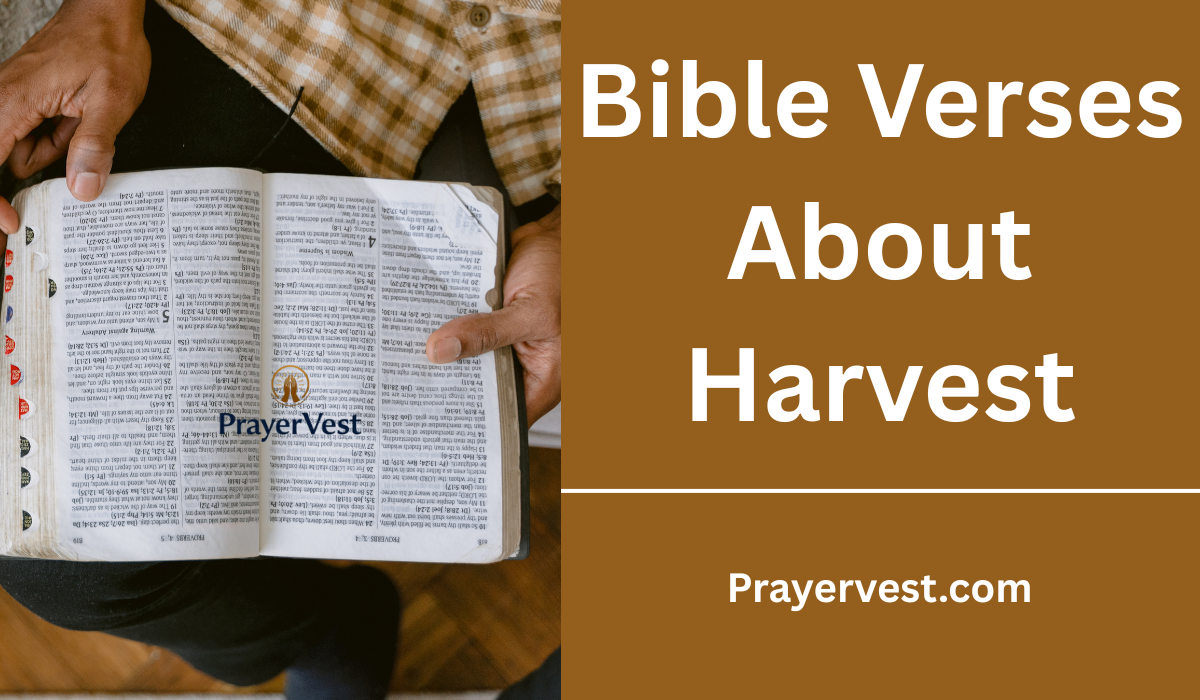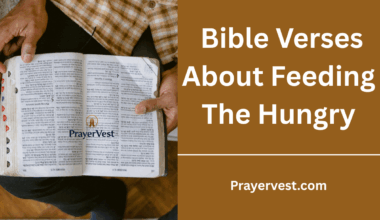The Bible is filled with references to the harvest, both literally and figuratively. The harvest was a symbol of provision, blessing, and the accomplishment of God’s promises in biblical agricultural civilizations.
Grain-ripening fields and fruit-bearing vines served as reminders of God’s fidelity and concern for His people. Scripture frequently emphasizes the value of thankfulness during harvest, urging Christians to recognize God as the real giver of all good things and to give liberally to everyone, especially the underprivileged and strangers.
The Bible employs harvest as a potent metaphor for spiritual truths that go beyond the actual collecting of crops. Jesus frequently used the parable of the harvest to highlight the need for haste and preparedness in carrying out God’s work and to explain the gathering of souls into God’s kingdom.
The idea that our deeds have consequences, whether positive or negative, is revealed in passages about sowing and reaping. This serves as a reminder to Christians that the things we plant in faith, obedience, and love will eventually bear fruit. Harvest thus turns into a sobering reminder of one’s responsibility to God as well as a promise of blessing.


Examining Bible passages about harvest encourages us to consider God’s supply, our duty to practice stewardship, and the timeless lessons associated with planting and harvesting. Knowing that God honors tenacity and trust, these verses encourage believers to live lives of faithfulness, charity, and dedication. The imagery of the harvest, whether in seasons of plenty or waiting, gives us hope by serving as a constant reminder that God’s timing is flawless and His promises are always fulfilled. By reflecting on these verses, we learn to trust the Lord of the harvest in every season and receive encouragement for our spiritual and everyday lives.
40 Inspiring Bible Verses About Harvest (2026)
1. Genesis 8:22
“As long as the earth endures, seedtime and harvest, cold and heat, summer and winter, day and night will never cease.”
This verse reminds us of God’s unchanging promise of cycles and seasons. Harvest is not just about crops but also about the assurance of God’s provision. It highlights that as long as the world exists, God has ordained times of sowing and reaping. This assurance brings hope and stability, teaching us to trust Him in every season of life.
2. Leviticus 26:4
“I will send you rain in its season, and the ground will yield its crops and the trees their fruit.”
Here, God promises blessings upon the land when His people walk in obedience. Harvest is directly tied to divine favor and covenant relationship. This verse emphasizes that abundance is not merely the result of human effort but is ultimately a gift from God. When we align ourselves with His will, we experience fruitfulness in every area of life.
3. Proverbs 10:5
“He who gathers crops in summer is a prudent son, but he who sleeps during harvest is a disgraceful son.”
This verse highlights the importance of diligence and wisdom during the harvest season. A prudent person recognizes the value of opportunity and acts wisely, while laziness brings shame and loss. It reflects not only agricultural harvests but also spiritual opportunities God presents to us. Seizing the right moment is key to reaping blessings.
4. Matthew 9:37-38
“Then he said to his disciples, ‘The harvest is plentiful but the workers are few. Ask the Lord of the harvest, therefore, to send out workers into his harvest field.’”
Jesus uses the imagery of harvest to describe the spiritual readiness of souls to receive the gospel. The problem is not the lack of harvest but the lack of laborers willing to go. This passage calls believers to prayer and action, urging us to participate in God’s mission field with urgency and dedication.
5. Galatians 6:9
“Let us not become weary in doing good, for at the proper time we will reap a harvest if we do not give up.”
This verse connects perseverance with harvest. It teaches that good deeds and faithfulness may not yield immediate results, but in God’s timing, they produce an abundant harvest. It encourages believers to remain steadfast, trusting that their labor in righteousness will bring eternal rewards.
6. Psalm 107:37-38
“They sowed fields and planted vineyards that yielded a fruitful harvest; he blessed them, and their numbers greatly increased, and he did not let their herds diminish.”
This psalm celebrates God’s blessings on those who plant and labor. The harvest is portrayed as the direct result of God’s favor and provision. It reflects His power to turn barren land into fruitfulness, showing that He alone can multiply both people and possessions when His hand rests upon them.
7. Proverbs 11:18
“A wicked person earns deceptive wages, but the one who sows righteousness reaps a sure reward.”
Here, harvest imagery is applied spiritually. The righteous will always reap lasting rewards, while the wicked gain only fleeting returns. This verse encourages sowing righteousness, showing that what we plant in life directly influences what we harvest. God promises a dependable reward for those who live faithfully.
8. Isaiah 9:3
“You have enlarged the nation and increased their joy; they rejoice before you as people rejoice at the harvest, as warriors rejoice when dividing the plunder.”
The prophet compares great joy to that of harvest time. Harvest symbolizes abundance, relief, and celebration after hard work. This verse shows that God’s blessings bring overflowing joy, reminding us that spiritual victories are as fulfilling as gathering crops after a long season of labor.
9. Joel 3:13
“Swing the sickle, for the harvest is ripe. Come, trample the grapes, for the winepress is full and the vats overflow—so great is their wickedness!”
Here, harvest is used as a metaphor for judgment. Just as ripe crops must be gathered, so too will God bring justice upon nations. This verse reminds us that harvest imagery in the Bible often carries dual meanings: one of blessing and another of divine reckoning.
10. Hosea 10:12
“Sow righteousness for yourselves, reap the fruit of unfailing love, and break up your unplowed ground; for it is time to seek the Lord, until he comes and showers his righteousness on you.”
This verse calls for spiritual renewal using harvest language. By sowing righteousness, believers can reap God’s steadfast love. The image of breaking unplowed ground suggests repentance and openness to God’s word, preparing the heart for His blessings.
11. Matthew 13:30
“Let both grow together until the harvest. At that time I will tell the harvesters: First collect the weeds and tie them in bundles to be burned; then gather the wheat and bring it into my barn.”
Jesus uses harvest to symbolize the final judgment. Wheat represents the righteous, while weeds signify the wicked. The harvest is the appointed time when God will separate the faithful from the unfaithful, showing His perfect justice and ultimate reward for those who belong to Him.
12. John 4:35
“Don’t you have a saying, ‘It’s still four months until harvest’? I tell you, open your eyes and look at the fields! They are ripe for harvest.”
Jesus shifts focus from physical harvest to spiritual readiness. He urges His disciples to see the urgency of souls ready to receive the gospel. This verse reminds us not to delay but to act now in spreading the message of salvation.
13. 2 Corinthians 9:10
“Now he who supplies seed to the sower and bread for food will also supply and increase your store of seed and will enlarge the harvest of your righteousness.”
Paul reassures believers that God is the ultimate provider. Just as He gives seed and bread, He also blesses those who sow generously with spiritual abundance. The “harvest of righteousness” points to both earthly provision and eternal rewards.
14. James 5:7
“Be patient, then, brothers and sisters, until the Lord’s coming. See how the farmer waits for the land to yield its valuable crop, patiently waiting for the autumn and spring rains.”
James uses harvest imagery to teach patience in awaiting Christ’s return. Just as farmers wait for crops with trust and endurance, believers must wait with faith and perseverance, knowing God’s promises will be fulfilled in due season.
15. Revelation 14:15
“Then another angel came out of the temple and called in a loud voice to him who was sitting on the cloud, ‘Take your sickle and reap, because the time to reap has come, for the harvest of the earth is ripe.’”
In this apocalyptic vision, harvest symbolizes the final gathering of souls. It shows the sovereignty of God, who determines the right time for reaping. This verse reminds us of the urgency of salvation and the certainty of God’s final judgment.
16. Exodus 23:16
“Celebrate the Festival of Harvest with the firstfruits of the crops you sow in your field. Celebrate the Festival of Ingathering at the end of the year, when you gather in your crops from the field.”
God commanded Israel to mark their harvest with worship and thanksgiving. The Festival of Harvest (Pentecost) and the Festival of Ingathering (Tabernacles) reminded them that every blessing comes from Him. These festivals were not just agricultural; they were spiritual acts of gratitude and dependence. This teaches us that true abundance is acknowledged when we offer back to God our first and best, recognizing Him as the source of all provision. Even today, it challenges us to make thanksgiving central in our seasons of increase.
17. Deuteronomy 24:19
“When you are harvesting in your field and you overlook a sheaf, do not go back to get it. Leave it for the foreigner, the fatherless and the widow, so that the Lord your God may bless you in all the work of your hands.”
Harvest in the Bible was not only about abundance but also about generosity. God commanded His people to leave portions of their crops for the poor and vulnerable. This reveals God’s heart for justice and compassion, teaching that blessings should be shared, not hoarded. It reminds us that our harvest—whether material wealth, spiritual gifts, or opportunities—becomes most meaningful when it is used to lift others. A generous harvest is a blessed harvest.
18. Psalm 126:5-6
“Those who sow with tears will reap with songs of joy. Those who go out weeping, carrying seed to sow, will return with songs of joy, carrying sheaves with them.”
This poetic psalm connects human suffering with divine reward. Sowing in tears represents seasons of struggle, pain, and faithful perseverance. Harvest here becomes a metaphor for restoration and joy, showing that God never wastes our trials. He transforms our sorrow into abundance, turning lament into praise. This verse assures us that every sacrifice made in faith will yield a joyful harvest in God’s perfect time.
19. Proverbs 20:4
“Sluggards do not plow in season; so at harvest time they look but find nothing.”
This proverb emphasizes the principle of diligence. Harvest requires effort and preparation; laziness leads to emptiness. Spiritually, it warns us not to neglect the seasons God gives for sowing prayer, service, and obedience. Those who delay or avoid responsibility will miss the fruit of blessing. It’s a sobering reminder that what we fail to plant now cannot be reaped later.
20. Jeremiah 5:24
“They do not say to themselves, ‘Let us fear the Lord our God, who gives autumn and spring rains in season, who assures us of the regular weeks of harvest.’”
Jeremiah rebukes Israel for forgetting the source of their harvest. Though God faithfully sent rains and seasons, the people neglected gratitude and obedience. This verse warns against taking God’s provision for granted. Every harvest season should inspire humility, reverence, and thanksgiving to the Lord who sustains life. It challenges us to live in continual awareness of His faithfulness.
21. Matthew 13:39
“The enemy who sows them is the devil. The harvest is the end of the age, and the harvesters are angels.”
In Jesus’ parable of the weeds, harvest represents the final separation of good and evil. The righteous will be gathered by God, while the wicked face judgment. This shows that harvest is not only about blessing but also accountability. It reminds us that every seed—whether of righteousness or sin—will bear fruit, and God’s justice will ultimately prevail.
22. Mark 4:29
“As soon as the grain is ripe, he puts the sickle to it, because the harvest has come.”
Jesus uses this imagery to show how the kingdom of God grows mysteriously yet inevitably. Farmers cannot fully control how seeds sprout, but when the harvest is ready, it comes swiftly. Likewise, God’s kingdom advances beyond human effort and will one day culminate in a great harvest. It teaches trust in God’s timing and readiness to respond when His appointed season arrives.
23. Luke 10:2
“He told them, ‘The harvest is plentiful, but the workers are few. Ask the Lord of the harvest, therefore, to send out workers into his harvest field.’”
Jesus emphasizes the urgency of mission work. The problem is never the lack of harvest but the scarcity of laborers willing to go. This verse challenges believers to pray for more workers and to be willing themselves to step into the fields of evangelism, service, and discipleship. The harvest of souls is ripe, and God invites us to be co-laborers with Him.
24. John 12:24
“Very truly I tell you, unless a kernel of wheat falls to the ground and dies, it remains only a single seed. But if it dies, it produces many seeds.”
Here, Jesus speaks of His own sacrificial death, using the harvest cycle as a metaphor. Like a seed that must die to produce fruit, His death would bring life to many. This verse shows that true harvest often requires sacrifice, surrender, and even suffering. It calls us to embrace the principle of dying to self so that God’s purposes may flourish through us.
25. 2 Corinthians 9:6
“Remember this: Whoever sows sparingly will also reap sparingly, and whoever sows generously will also reap generously.”
Paul reminds the church of the principle of generosity. Harvest is proportionate to sowing: the more one gives in love and faith, the greater the return in blessing. This is not limited to money but applies to kindness, service, and spiritual investment. God promises that those who sow abundantly into His kingdom will reap abundantly from His hand.
26. Job 4:8
“As I have observed, those who plow evil and those who sow trouble reap it.”
Job’s friend Eliphaz speaks a timeless principle: sowing evil leads to a harvest of destruction. While his application to Job’s suffering was misguided, the truth remains that actions bear consequences. This verse warns against planting seeds of sin, selfishness, or injustice, because the harvest will inevitably bring pain. God’s justice ensures that we reap what we sow.
27. Isaiah 62:9
“But those who harvest it will eat it and praise the Lord, and those who gather the grapes will drink it in the courts of my sanctuary.”
This verse paints a picture of restoration and peace. Instead of enemies stealing their crops, God promises that His people will enjoy the fruit of their labor in His presence. The harvest becomes an occasion for worship, not loss. It symbolizes security, blessing, and intimate fellowship with God.
28. Micah 6:15
“You will sow but not reap; you will press olives but not use the oil, you will crush grapes but not drink the wine.”
Here, harvest is withheld as a form of judgment. Though people labor, they cannot enjoy the fruit because of their rebellion. This verse shows that sin disrupts blessing, and without obedience, harvest turns into futility. It warns us to align our lives with God’s will so that our efforts are not wasted.
29. Zechariah 10:1
“Ask the Lord for rain in the springtime; it is the Lord who sends the thunderstorms. He gives showers of rain to all people, and plants of the field to everyone.”
Harvest is impossible without rain, and this verse directs Israel to seek God, not idols, for provision. It highlights dependence on divine favor rather than human effort. Spiritually, rain represents God’s outpouring of blessing and revival. This teaches us that prayer is vital for harvest, both physical and spiritual.
30. Hebrews 12:11
“No discipline seems pleasant at the time, but painful. Later on, however, it produces a harvest of righteousness and peace for those who have been trained by it.”
Discipline is likened to sowing that later produces a harvest. Though correction is difficult, it shapes character and yields righteousness. This verse reframes hardship as a process that leads to spiritual maturity. Just as farmers endure labor for the joy of harvest, believers must endure God’s training for the fruit of holiness and peace.
31. Leviticus 19:9-10
“When you reap the harvest of your land, do not reap to the very edges of your field or gather the gleanings of your harvest. Do not go over your vineyard a second time or pick up the grapes that have fallen. Leave them for the poor and the foreigner. I am the Lord your God.”
This command highlights God’s concern for justice, mercy, and provision for the marginalized. Harvest was not to be consumed selfishly but shared with the vulnerable. God’s people were called to reflect His generosity by ensuring no one was left behind. This principle teaches that our blessings, whether material or spiritual, are never solely for us but are meant to uplift others. A godly harvest is one marked by compassion.
32. Ruth 2:23
“So Ruth stayed close to the women of Boaz to glean until the barley and wheat harvests were finished. And she lived with her mother-in-law.”
Ruth’s story shows how God works through harvest seasons to provide and fulfill His purposes. Her faithfulness in gleaning led to divine connections and eventual redemption through Boaz. This verse reminds us that God often uses ordinary labor and seasons of harvest to bring extraordinary blessings. Staying diligent and faithful in small tasks can position us for greater opportunities in God’s plan.
33. Isaiah 55:10-11
“As the rain and the snow come down from heaven, and do not return to it without watering the earth and making it bud and flourish, so that it yields seed for the sower and bread for the eater, so is my word that goes out from my mouth: It will not return to me empty but will accomplish what I desire and achieve the purpose for which I sent it.”
Here, God compares His word to rain that ensures a harvest. Just as rain nourishes the soil, His word accomplishes His purposes unfailingly. The harvest symbolizes the results of God’s promises coming to fruition. This passage gives us confidence in the power of Scripture—it never fails but always produces fruit in due time.
34. Jeremiah 8:20
“The harvest is past, the summer has ended, and we are not saved.”
This verse reflects the sorrow of missed opportunity. The people lament because the time for harvest—and by extension, deliverance—has passed without blessing. It is a sobering reminder that harvest seasons do not last forever. Spiritually, it calls us to recognize the urgency of salvation and obedience before it is too late.
35. Amos 9:13
“The days are coming,” declares the Lord, “when the reaper will be overtaken by the plowman and the planter by the one treading grapes. New wine will drip from the mountains and flow from all the hills.”
This prophecy envisions an overwhelming, continuous harvest, symbolizing God’s abundant restoration for His people. The image of one harvest overtaking another portrays unstoppable blessing. Spiritually, it points to seasons when God pours out so much fruitfulness that there is no gap between sowing and reaping. It’s a vision of supernatural abundance.
36. Matthew 13:23
“But the seed falling on good soil refers to someone who hears the word and understands it. This is the one who produces a crop, yielding a hundred, sixty or thirty times what was sown.”
In the parable of the sower, Jesus describes a fruitful harvest as the result of receptive hearts. The soil represents our openness to God’s word, and the harvest symbolizes transformed lives and multiplied impact. This verse challenges us to cultivate hearts ready to receive truth, ensuring that what God plants in us grows into abundance.
37. Mark 4:20
“Others, like seed sown on good soil, hear the word, accept it, and produce a crop—some thirty, some sixty, some a hundred times what was sown.”
Mark echoes the same parable, emphasizing that acceptance of God’s word produces an exponential harvest. It shows that not all harvests are the same, but every faithful response bears fruit. This verse reassures us that even small seeds of faith and obedience can lead to great spiritual abundance when nurtured by God.
38. John 6:27
“Do not work for food that spoils, but for food that endures to eternal life, which the Son of Man will give you. For on him God the Father has placed his seal of approval.”
Jesus shifts the focus from physical harvest to eternal sustenance. He warns against chasing temporary harvests while neglecting what is eternal. The true harvest is found in Him—the bread of life—who offers eternal fulfillment. This verse calls us to labor for what lasts: faith, righteousness, and the kingdom of God.
39. Philippians 1:11
“Filled with the fruit of righteousness that comes through Jesus Christ—to the glory and praise of God.”
Paul describes a spiritual harvest of righteousness that glorifies God. The fruit is not produced by human effort but through Christ’s work in believers. This verse highlights the ultimate purpose of every harvest: God’s glory. It reminds us that righteousness is both the seed and the fruit of a life surrendered to Christ.
40. Revelation 22:2
“Down the middle of the great street of the city, on each side of the river, stood the tree of life, bearing twelve crops of fruit, yielding its fruit every month. And the leaves of the tree are for the healing of the nations.”
In this vision of the New Jerusalem, harvest is eternal and unending. The tree of life bears fruit perpetually, symbolizing complete provision and healing for all nations. This final harvest is not seasonal but everlasting, pointing to the eternal abundance awaiting God’s people. It is the ultimate fulfillment of every harvest promise in Scripture.
Conclusion
To sum up, biblical passages about harvest serve as a reminder that each sowing and reaping season has both material and spiritual significance. The harvest serves as a reminder of God’s abundant provision as well as a call to thankfulness, giving, and obedient stewardship. Believers today are urged to acknowledge God’s hand in their blessings and to give to those in need, just as the Israelites did when they gathered their crops in gratitude. We learn from the harvest that everything we get is a result of God’s faithfulness and our cooperation in His work, not a coincidence.
Deeper down, the harvest alludes to timeless realities about God’s kingdom. According to Jesus’ teachings, the gathering of souls and the everlasting reward for obedient living constitute the ultimate harvest. These verses encourage us to work hard and serve as a reminder that our efforts will be rewarded with long-lasting results. We can learn to trust God’s timing, hold fast to our faith, and anticipate the final harvest when His promises are fully realized by thinking back on harvest verses.






